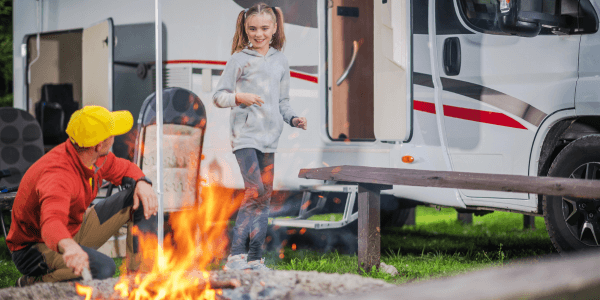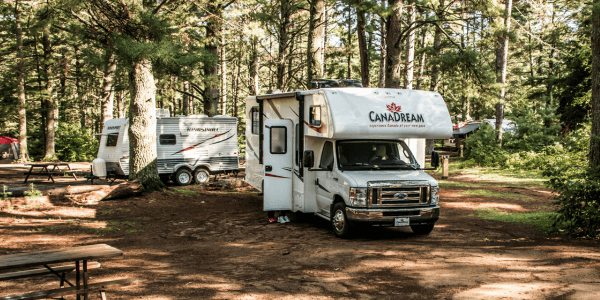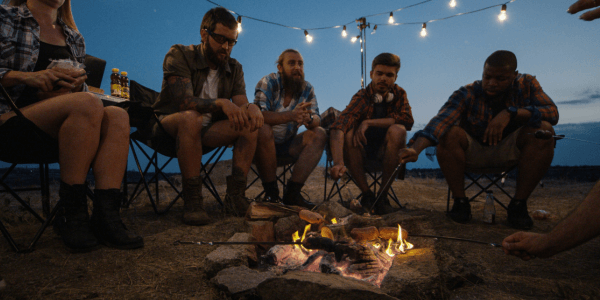Canada has long been revered as a courteous and polite nation and whether you are a visitor to a different province or an international visitor, you can expect to experience a warm welcome to match the breathtaking outdoor beauty wherever you go.
So why would we not expect Campers to display the same level of courtesy when experiencing Canada in an RV? For most people this holds true, however, negative stories always get more airtime than positives, so this blog will detail what courtesies are and why they are important, outline common Canadian camping rules and regulations you will be expected to follow while RV camping, and offer simple tips to help preserve Canadian wilderness.

Why Care about Courtesy?
While RV camping in Canada, it is important to adopt good camping practices. You’ll find every campsite has their own regulations and we recommend you understand these before getting comfy in your site. Engaging in kind actions and following common courtesies will improve other’s camping experiences as well as your own.
Keeping noise levels down at nighttime is the most basic rule, keeping your camping area garbage free to avoid attracting animal visitors, not overcrowding your site with groups of friends, kids playing noisily early in the mornings or late at night outside neighbouring campers are some of the common causes of bad neighbourly behaviours.
If you are adhering to the noise rules, chances are, your camping neighbours will as well. Additionally, courtesies between camping site neighbours are wonderful options for ‘free security systems’ while you are away from your campsite.
A respectful relationship between you and your camping neighbours will often go a long way in increasing your positive camping experience. The potential for social opportunities with your neighbours will only increase the fun!
‘Due’ Your Diligence
Researching and reviewing the rules and regulations of the park you will be exploring or RV camping in is a good idea, it may save you from booking a campsite that isn’t right for your needs. Perhaps they don’t allow pets and your want to bring yours with you.

RV Driving: Safety on Roadways
RVs come in all shapes and sizes, but it's pretty common that all are larger than the average car, so driving with caution is very important. Taking journeys at a slower pace, stopping more often for rest breaks, and planning fuel stops are important parts of safe driving. Swapping driving shifts is another good way of keeping focus, one person can enjoy the views or help navigate while the other concentrates on the roads and traffic conditions. Most Canadian drivers are familiar with the summertime RV convoys along the major highways, but just make sure you don’t try to race or keep up with the speeds they may be doing. Take corners with care, slow down on steep descents, use tow-haul to prevent overheating of brakes and always signal before stopping. International drivers may be on an unfamiliar side of the road, so things may need even more care when negotiating junctions and roundabouts.
Remain in the far right-hand lane while travelling unless you are overtaking/passing, and turn into any designated ‘pull-off points’ on single-lane highways to allow vehicles to pass in a safe manner.
National Park Fees: Proudly Paying for the Privilege
National, provincial and some recreationally zoned areas in Canada require payment for entry and reserved use. Fees are key funding sources on which parks rely upon to organize, plan, and maintain ongoing operational efforts related to environmental and wildlife rehabilitation, land maintenance, and protection measures. Please pay the appropriate fees for being a visitor. Avoid the queues at the National Park entrances by buying your Parks Pass in advance, so you can simply sail past the entry points.
Campfire Nights
Check the regulations of the campsite to make sure you are allowed open fires. There are often strict campfire bans in summer due to forest fire risk. Where allowed to have a campfire, ensure you clear up afterwards. The rule of thumb when putting out a fire is soak, stir, and soak again. This step is crucial.
Fish Finder
If you plan to fish, make sure you research which fishing license you will need in the area you plan to fish. Some licenses require in-person purchase while others can be purchased online. Fish and Wildlife Officers regularly patrol recreational areas and provincial parks. Large fines are issued to people fishing without a license.
Local Love
Shopping at local small businesses, farmers markets and mom and pop grocery and convenience stores is a kind way to support businesses that may rely on tourist season to make a living. Shopping locally reduces the product’s carbon footprint which contributes to greener camping practices and therefore, is a courteous action to take! Local businesses offer unique amenities and products not available in big chain stores, making the shopping experience more personal, memorable and enjoyable. When camping with your whole family, it's always a good idea to be considerate of your campground town and support the local businesses in the area.
Shared Facilities
When using shared kitchen, washroom, and laundry facilities always clean up after you have used them. Leaving them tidy for the next visitor. Campsie laundry facilities could either be set up to pay by coins, credit card, or through the camp host.

Tips to Camp like a Champ
- Respect noise levels outlined by the campsite.
- Respect campsite spaces and the boundary lines of sites near your own.
- Keep pets on a lead and scoop and dispose of their poop properly.
- Recycle and dispose of garbage in the correct way.
- Obey fire pit rules.
- Operate by “Leave no trace” camping principles when moving on.
- Stay on the hiking/walking trails when directed.
- Take care not to disturb nature and wildlife around you, do not chop down trees for firewood use.
- Dispose of grey and black waste tanks at appropriate dumping stations.
- Be a courteous visitor to new communities.
- Be curious about the history and geography of the places you visit.
- Write kind reviews where you get great service and share the word.
As a visitor camping, be the type of visitor that you’d like to welcome to your own country. Travel responsibly, tread lightly and tidy up everywhere you go.
Be prepared to meet people who are being openly friendly, eager to connect and excited to learn about you and your impressions of Canada’s natural beauty and wildlife.







